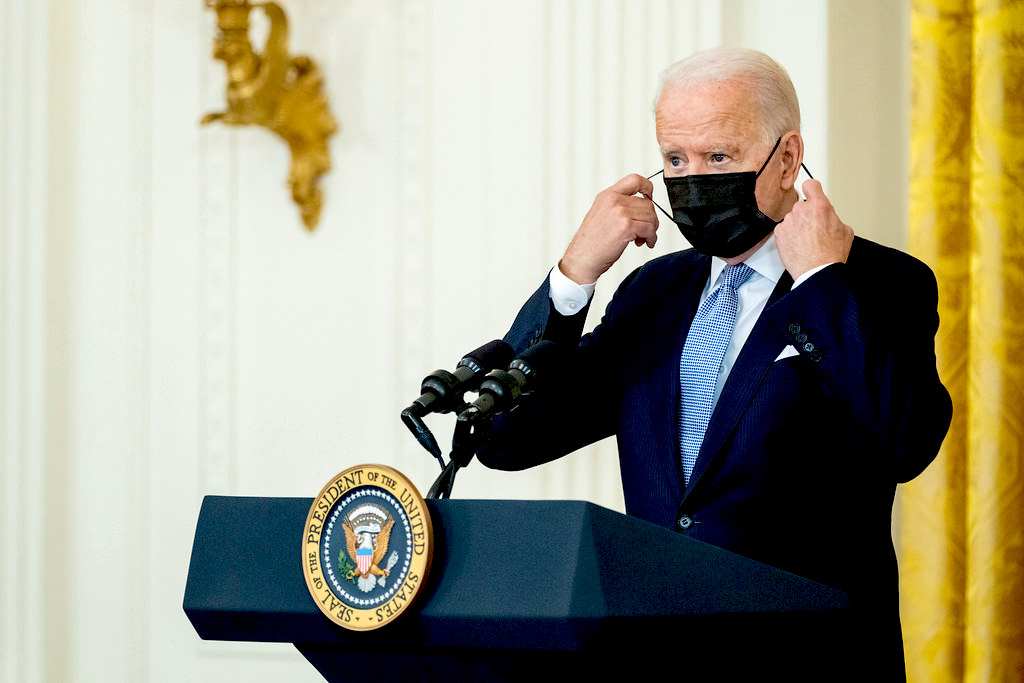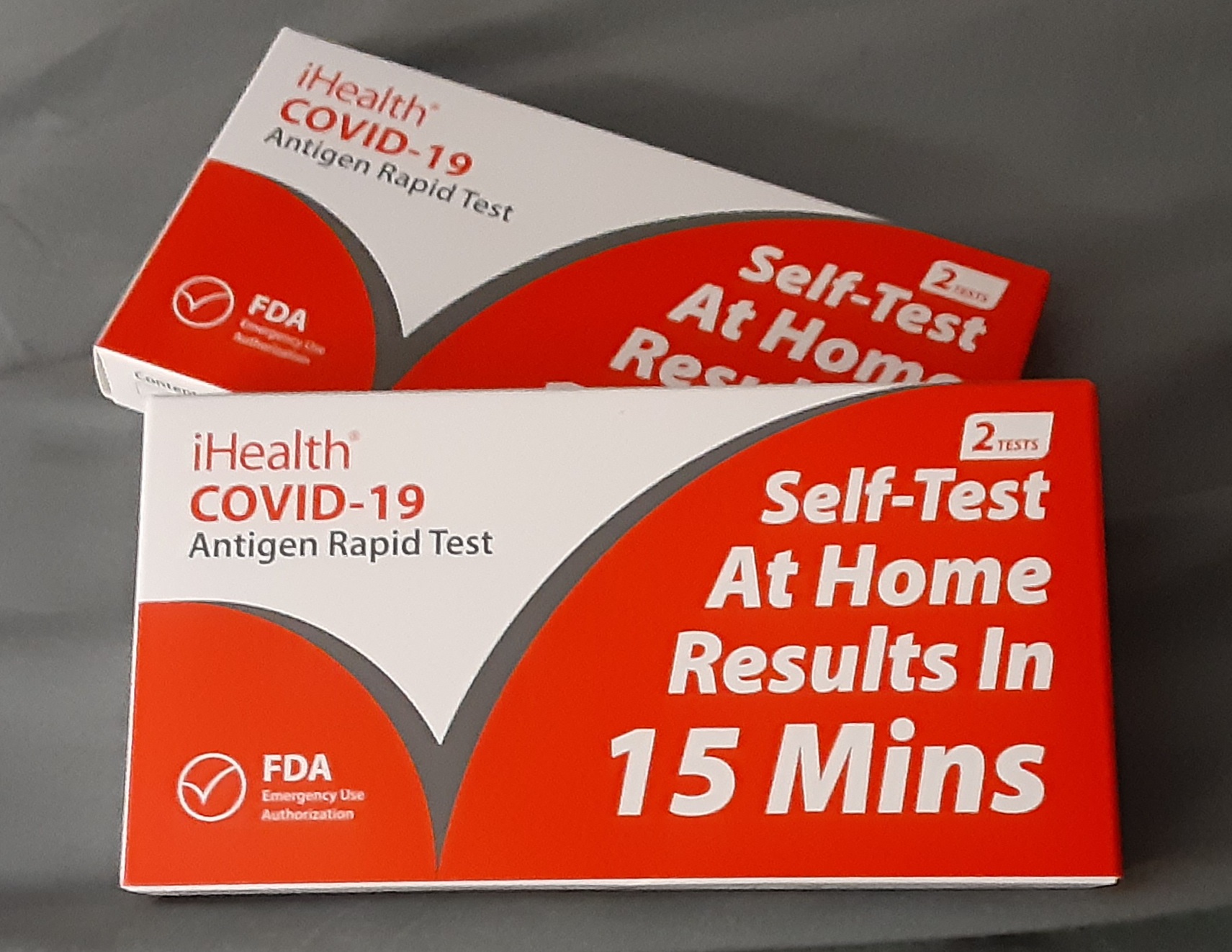The cuts are a result of Biden’s refusal to continue the Covid-19 public-health-emergency declaration, which ends Trump’s Medicaid pandemic coverage expansion.

President Joe Biden preparing to speak on Covid-19 and the economy, July 29, 2021, (White House/ Adam Schultz)
As U.S. news consumers were inundated with coverage of the spectacle of former President Donald Trump’s arraignment this week, 15 million people were quietly facing the prospect of being quietly phased out as beneficiaries of the Medicaid and Children’s Health Insurance Program (CHIP). The cuts began on April 1 and continue through May and July.
The Biden administration is ending the Covid-19 public health emergency declaration on May 11 and in line with that, starting this past weekend, states began begun to kick people off of Medicaid and CHIP. The first states to cut beneficiaries are Republican Party-controlled Arizona, Arkansas, Idaho, New Hampshire and South Dakota. The cuts will continue in other states.
Medicaid and CHIP are the limited government health insurance programs that are offered within the context of the United States’ hyper-privatized healthcare system. These programs are only available for those who meet (extremely low) income requirements.
As an example, in the state of Texas, parents within a family of three must receive below $3,684.8 in annual income to be eligible for Medicaid. Childless adults in Texas can never qualify for Medicaid, and the same is true in other states.
However, this changed during the height of the pandemic. In March 2020, Trump signed the Families First Act, which increased federal funds for Medicaid for states on two conditions: states would not make Medicaid eligibility stricter and would not unenroll anyone receiving Medicaid at the time.
This meant that even if Medicaid recipients began to exceed the income threshold after being enrolled, they would not be kicked off the program.

President Donald Trump signing Families First Coronavirus Response Act on March 18, 2020. (Public domain)
In choosing to end the public health emergency, Biden is doing away with this Trump-era measure. As a result, his own administration estimates that 8.2 million people will lose their eligibility; 6.8 million more will lose coverage due to “administrative churning” or simple bureaucratic complications, such as failing to re-enroll, as the Covid-19 state of emergency eliminated the necessity of doing so.
Young people and people of color will be disproportionately impacted — 5.3 million children and 4.7 million young adults aged 18-34 will lose their public healthcare coverage. Almost one third of the 15 million losing coverage are Latino and 15 percent are Black. For comparison, 1-in-5 people in the U.S. are Latino and 14.2 percent are Black.

U.S. government issued Covid test kit. (Viiticus, CC BY-SA 4.0, Wikimedia Commons)
Alongside Medicaid/CHIP, other health emergency benefits will also be eliminated after May 11, such as free at-home testing and Covid-19 treatment for Medicaid/Medicare recipients. Extra food assistance already ended in 32 states after February, putting 30 million people on what some called a “hunger cliff.”
Many in the U.S. government have been clamoring to end pandemic-era protections for months now. These include GOP lawmakers who used Biden’s comments about the pandemic being “over” back in September to argue against approving more relief money.
“It also begs the question as to why [Biden is approving] other pandemic-related measures, like student-loan forgiveness, cancellations,” said South Dakota Senator John Thune.
Twenty five Republican governors wrote Biden to call for an end to emergency Medicaid expansion back in December. “It is time we move on from the pandemic and get back to life as normal,” they wrote.
In the United States, it is apparently “normal” for 15 million people to lose their right to healthcare.
This article is from Peoples Dispatch.
The views expressed are solely those of the author and may or may not reflect those of Consortium News.

I have lived in 3-4 different countries with different social standings but…I’ve never encountered a country that is so ANTI SOCIAL as the US.
Even Cuba can afford better medical universal coverage.
It’s almost funny that the U.S. would provide these benefits only for a fake “emergency” in order to scare the pants off the public and get them to comply.
Is it not true that the most wonderful and exceptional United States, beneficent leader in all things, has actually been influencing socially liberal countries in places like Canada and throughout Europe that did have excellent national health plans that covered basically all costs to begin substantially cutting back on both services and payments. I recall back in the 90’s an American faculty colleague requiring emergency surgery while on sabbatical in Scotland. He was charged absolutely nothing, even though not a citizen of the UK. Allegedly not true today. Moreover, lengthy waits for any services now.
If they mimic the US any further, they will also start adding whopping “out of network” charges which add thousands of dollars to any attention in the emergency room or admission as an “in patient.” Certain specialities (you will know what they are if you’ve needed emergency treatment) are notorious for remaining out of network specifically to vastly inflate their charges (usually triple or quadruple standard negotiated rates). I suppose to make it sound like fun, they call the practice “surprise billing.”
Insurance companies refuse to pay them such extortion, so the patient gets rolled for the cash or the obliteration of his credit record–either way, imminent pauperization looms. Even the remaining church-sponsored non-profit hospitals have become “pay-up-front” hard core bastions of uber capitalism. Yeah, good times ahead, Europe, if you continue to emulate the USA. And any remaining genuine socialist countries, like China, Venezuela or Cuba, how dare you put human life ahead of “freedom,” “democracy” and profit!
Why is it always the Govt responsibility to bail people out. Govt should not be responsible for everything in our lives. Maybe if it had begun long ago may have worked but cannot be implemented now w our financial issues.
It’s obviously not the government’s responsibility to always bail people out but it is the government’s responsibility to pass legislation that makes the country a better place. This will mean helping people who, often through bad luck or no fault of their own, need assistance. America is supposed to be “one nation under God”. What kind of a God would want people to have their lives shortened or destroyed by a lack of access to healthcare? If the government doesn’t improve people’s lives then what’s the point of having governments?
Nice try. It is now a federal mandate that bailing out banks will not be questioned or denied. Banks are not members of the citizenry, however. They are drunk, hungry without cessation casino visitors who bundle securities and let us pick up the losses when they occur. The “under God” schtick is a sick campaign ploy of the Eisenhower administration to stymie the godless Communists. It was not considered acceptable before then as a tag on our national spirit. As James Monroe pointed out, we are in no way a Christian nation. That is an anti-American sentiment. I agree with you on healthcare, however. But if God is needed for the right to healthcare, the doctor doesn’t need to show up. We might as well be bled drier than we already are.
Well said Peter.
“our financial issues.”
We have plenty of money for the merchants of death and ukraine. Then none for us on Main Street in Amerika. Sorry you feel that way
It’s the minimum sign of civilisation to educate your population and keep them healthy. And even the private sector benefits massively from having healthy and well educated workers.
It would help to clarify if this is an issue that affects states with stringent requirements for benefits, like Texas, or not. If this is issue related to state policies, then the recourse may exists at the election time.
“…in the state of Texas, parents within a family of three must receive below $3,684.8 in annual income to be eligible for Medicaid. Childless adults in Texas can never qualify for Medicaid, and the same is true in other states.”
Absolutely obscene.
But Bernie Sanders assured me that the Biden administration would be the most progressive ever.
A flight of fancy or a brazen lie at the behest of the Biden-ites? You decide.
The dis-United States is a disgusting example of a country.
Hey, but at least they can send billions more to Ukraine /sarc
“In the United States, it is apparently ‘normal’ for 15 million people to lose their right to healthcare.“
Yup, it sure IS statistically ‘normal’ for poor people in the US NOT to have healthcare, just like it’s normal for many poor people to sleep on the streets, and normal to have monthly school shootings, etc. You see, we instead have to use the money to buy arms for our military to go overseas and bomb various countries to convince them that our democratic way of life is the best and most desirable. There…it’s $imple really…
Yet Biden and his coterie of zionist/neoconservative anti-Americans issue blank checks for ukrozionazis
It’s all subsidies for BigPharma and the Health Extortion Industries anyway. The US does not have a health care system, it’s a neo-feudal patchwork of private interests. The US has the lowest average life expectancy in the entire OECD, and it continues to fall. This started even before the pandemic. The US has Health Extortion, not health care.
The US notoriously has the most expensive “health care” in the world, with the worst health outcomes. That’s what I call a great extortion racket.
The Mafia is more honest, they say: “nothing personal, strictly business” they just want the money. The health extortion racket pretends to care about patient and public welfare. Let’s just be honest about it.
Or: since we have a declining life expectancy and AI will render much of the workforce “redundant”, let’s start up a Soylent Green market on the commodities exchange. Soylent Green can solve our climate/environmental crisis by providing Green Energy, and Organic Fertilizer, and even food. We can get in on the ground floor of this new industry and make a killing!
(sorry for the bitterly sarcastic humor)
Nailed it, sadly.
I have had Soylent Green on my mind for a couple of years now. It’s not the exact model, and it’s a clumsy, poorly scripted film. Regardless, the impacts of AI create a spectacular crisis that we have to face up to. Billions will become “useless.” What does this portend? Mega welfare on as colossal scale? How long will that last? Perhaps a loss of full citizenship, even reproductive status since on UBI for a long, unproductive life? If we continue to approach problems with our usual misdiagnosis and/or neglect, it will become necessary for these unlucky individuals to be swept away. They will be seen as too expensive to perpetuate. And if the sweeping away doesn’t occur smoothly, then it will be Babi Yar.
Which is why I advocate for voluntary, highly incentivizes sterizlization all on earth. The rewards have to be substantial–god knows, maybe even equally combined worldwide war budgets. But nothing works without getting this population down dramatically from its 8 billion and counting numbers. No jaw jaw on that score.
Don’t apologize. You’re right on the money – without supporting the health-care Mafia, of course.
“The Mafia is more honest, they say: “nothing personal, strictly business” they just want the money. The health extortion racket pretends to care about patient and public welfare. Let’s just be honest about it.”
This explains my feelings about Republican politicians vs. Democratic.
On the Social Security side, decreased life expectancy improves the balance. But bloated cost of Medicare probably removes this budgetary benefit and more. Interesting, among Anglo-Saxon countries, Australia has the lowest healthcare cost and very respectable outcomes. Medical-industrial-financial complex is responsible more more waste than military-security.
One unmentioned problem with loosing insurance is the discount system. I neglected “coverage” for medication one year, and I experienced an urgent need for Acyclovir that in Poland (checked on Internet, I understand Polish) costs ca. 4 dollars. But similar 5 g tube was 600 in USA, however, 15 g tube with CVS customer card was “only” 50. It is worth to know that in a virus outbreak you use less than a gram, and you should not keep the cream for more than two years, so even 2 g would be sufficient. This is a little cameo of how costs of generic drugs are manipulated, like almost EVERYTHING in medical care. In the little example here, there is a huge hurdle for having a medication at hand “just in case”. More outrageous situation concerns epinephrine, an essential drug to keep just in case if you are vulnerable to anaphilactic shock (history of strong allergic reaction), and managing to sell 1 dollar worth of medication for 300 dollars. But the issue is that with an insurance program, the program pays MUCH less (still a lot more than the cost), people with no coverage do not get “discounts” (actually, regular prices) and are driven to bankruptcy.
Of course, this is nickel-and-diming compared with medications and procedures that cost thousands of dollars.
“We can get in on the ground floor of this new industry and make a killing!”
Ha ha ha. Was that a deliberate pun? (Made me laugh anyway.)
‘In the United States, it is apparently “normal” for 15 million people to lose their right to healthcare.’
Well, duh: of course it is when referring to the portion of that right which was temporarily increased due to an emergency which has now been declar3ed to be over. Better to have pointed out that the right needs permanent extension to true universal health care of the Medicare For All variety (which Biden, if one recalls correctly, had promised during his presidential campaign to veto if it came to his desk). Perhaps we should have been more careful to choose leadership that is more supportive of our needs than to pleasing its donor base, though that would have been a dramatic change in the way we choose to vote.
Maybe you need a little more nuance in your life.
hxxps://www.politifact.com/factchecks/2020/mar/10/facebook-posts/when-biden-was-asked-if-he-would-veto-medicare-all/
While in the referenced link PolitiFact rates the statement’half-true’, if one reasonably discounts all the waffling words and the exceptional conditionality in Biden’s statement, a more accurate rating would be -90% true.